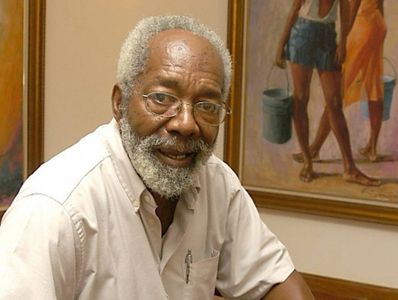Barrington Watson (1931 - 2016) - Jamaican Artist

Born in 1931 January 9th in Lucea, Barrington Watson made his original mark in Jamaica as a football player for Kingston College. However, he ultimately followed his artistic yearnings by enrolling at the Royal College of Art in London at the age of 20. Watson also studied at Academie de la Grande Chaumiere in Paris and the Rijksacademie in Amsterdam. He travelled widely and then returned to the first Director of Studies at the Jamaica School of Art and co-founded the Contemporay Jamaican Artists' Association (1964–74). He later served as visiting professor at Spelman College. In 1967 he won a prize at the first Spanish Biennale at Barcelona. In 2000 he was awarded a Gold Musgrave Medal by the Institute of Jamaica.
Watson has exhibited throughout Jamaica and internationally. He is the subject of Lennie Little-White's 2015 documentary film They Call Me Barrington.


Dawn Scott (1951 - 2010) - Jamaican Artist

Dawn Scott was a Jamaican-born artist and cultural commentator. Figurative batik was Dawn Scott’s main medium for some twenty years, culminating in her solo exhibition Nature Vive (1994) at the Grosvenor Galleries in Kingston. By far her most impactful exhibition, however, was her contribution to Six Options: Gallery Spaces Transformed (1985), the National Gallery’s (and Jamaica’s) first exhibition of installation art. On this occasion, she produced "A Cultural Object", a haunting, spiral-shaped “zinc fence” structure which transposed some of the realities of Jamaica’s inner city life into the gallery spaces of the National Gallery. She taught textile art at the School of Visual Arts, Edna Manley College of the Visual and Performing Arts, where she also served as an external examiner. She was also active as a fashion designer, and her handmade, hand-dyed clothes were in great demand locally in the 1980s and early 1990s. She received the Institute of Jamaica’s Centenary Medal in 1979 and a Bronze Musgrave Medal for merit in the Visual Arts in 1999. A Cultural Object was acquired by the National Gallery and is now on view in a gallery of its own in the permanent exhibitions, where it is one of the most popular exhibits.
"Indian Girl" by Dawn Scott

Dawn Scott interview - Rastafari: Conversations Concerning Women - Part One - (1983)
Dawn Scott interview - Rastafari: Conversations Concerning Women - Part two -(1983)
Patrick De Castro - Haitian-American Artist

I am a Haitian American artist. Born in Haiti and grew up in NYC. I attended Lycée Français in NY from elementary school to High School. I came to the States at the age of 4 years old. I returned to PAP to live with my family from 8 to 12 years old. I always wanted to be a painter. I remember being a toddler and seeing a Logo being painted on my great-grandparents' Radio Station in PAP and thinking to myself That’s what I want to do in the future. Back in Queens, NY. During adolescence, my Mom put up blockages on my trajectory to becoming an artist. But I studied art anyway in whichever way that I could. I studied art for a year formally in Florence Italy. This is where I met my first lover who was a graphic artist.. He influenced me a lot. I later studied Interior Design in Graduate School. The east village of Manhattan had a big influence on my artistic journey during the late 1980’s and 1990s. I later fell ill and struggled with a life threatening illness that took me to come and live in Miami. I struggled for 10 years before I recovered and applied to Art Center on Lincoln Rosd and became a professional artist.
After a few successes I completed my residency at the Center. I drifted and stopped working on art full time for many years. Then in 2019 I went to Quito Ecuador for a residency for 3 months! That took me back on my true path.






Designer Roshod Murphy of M.I.H bags

Roshod Murphy is the founder and creative force behind M.I. H. bags. A luxury brand centered on refined design and elevated travel essentials. Known for its sleek, modern bag collections that merge functionality with sophistication - created for individuals who value quality, confidence, and international style.
This website uses cookies.
We use cookies to analyze website traffic and optimize your website experience. By accepting our use of cookies, your data will be aggregated with all other user data.